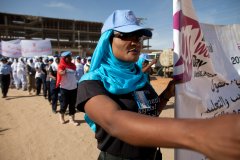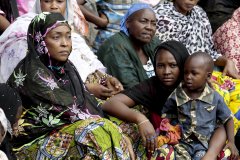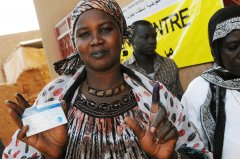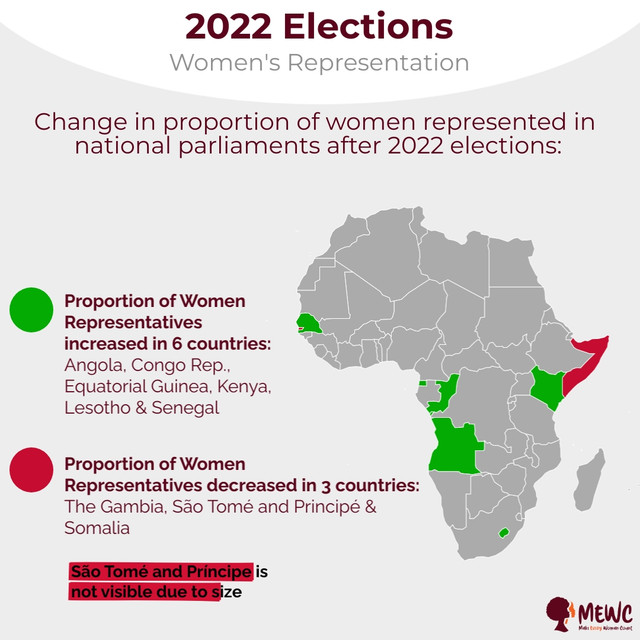Gender Issues Showlist
Women, Peace & Security
UNSCR 1325 calls on all parties to: protect and respect the rights of women and girls in conflict & post-conflict; increase women participation in all conflict resolution, peacekeeping and peace-building & to end impunity by prosecuting perpetrators of sexual and other violence on women and girls
index.php?option=com_content&view=category&id=56&Itemid=1913
Human Rights of Women
Thirty six years after the adoption of CEDAW, many women and girls still do not have equal opportunities to realize rights recognized by law. Women are denied the right to own property or inherit land. They face social exclusion, “honor killings”, FGM, trafficking, restricted mobility, early marriage,...
index.php?option=com_content&view=category&id=44&Itemid=1908
Violence Against Women
Violence against women is the most shameful human rights violation. Gender based violence not only violates human rights, but also hampers productivity, reduces human capital and undermines economic growth. It is estimated that up to 70 per cent of women experience violence in their lifetime
index.php?option=com_content&view=category&id=69&Itemid=1912
Political Participation & Leadership
Where women are fully represented, societies are more peaceful and stable. Women political participation is fundamental for gender equality and their representation in positions of leadership must be a priority for all Africans governments.
index.php?option=com_content&view=category&id=65&Itemid=1911
Latest News
- Rwanda: Presidential and parliamentary elections 2024
- Madagascar Parliamentary Elections 2024
- Chad Presidential Election 2024
- Togo: Parliamentary elections 2024
- NAMIBIA: Nandi-Ndaitwah Elected As Namibia's First Woman President
- Islamic Republic of Mauritania Presidential Election 2024
- The Republic of South Africa: Parliamentary Elections 2024
- LIBERIA: Ministry of Justice Launches Gender Policy and Strategic Action Plan for Inclusivity
- SOUTH SUDAN: South Sudan works to reintegrate young mothers back into school
- GAMBIA: Waho Screens Over Thousands of Women for Breast, Cervical Cancer
Rwanda: Presidential and parliamentary elections 2024
Rwanda held its presidential and parliamentary elections on 15 July 2024. Incumbent President Paul Kagame, leader of the Rwanda Patriotic Front (RPF), won a fourth term in office with 99.18% of the votes. The RPF also won 68.83% of the 53 seats in the Chamber of Deputies. Following the 2024 parliamentary elections, women’s representation in the lower house increased from 61.3% to 63.8%. Rwanda thus remains the country with the highest female representation in parliament globally.
Madagascar Parliamentary Elections 2024
On 29 May 2024, six months after the presidential polls, Madagascar held its parliamentary elections. The ruling party, IRMAR, secured the most seats, 84 out of 163, followed by Firaisankina, which gained 22 seats. Malagasy women remain underrepresented in the National Assembly, securing 16% of the seats compared to 84% among men.
Togo: Parliamentary elections 2024
The Union for the Republic (UNIR) won 95.6% of the seats in the Togolese parliamentary elections on 29 April 2024, securing 108 out of the 113 seats. While the Alliance for Democrats for Change (ADD) won 2 seats, the National Alliance for Change (ANC), Dynamic for the Majority of the People (DMP) and Democratic Forces for the Republic (FDR) each secured one seat. Women’s representation in parliament remains low, with 21 women elected to the National Assembly.
Chad Presidential Election 2024
On 6 May 2024, Chad held its presidential election. Mr Mahamat Idriss Déby, the transitional leader, won, securing 61% of the votes. Out of the ten presidential candidates, there was one woman. The election marked the return to civilian rule following the military takeover in 2021.
Islamic Republic of Mauritania Presidential Election 2024
On June 29, 2024, the Islamic Republic of Mauritania held its presidential election. The incumbent President, His Excellency Mohamed Ould Cheikh El Ghazouani, won a second term in office. While observers from the African Union described the election process as peaceful the post-election environment was reportedly marked by unrest and protests. There were no female presidential candidates.
2015 Elections Monitoring
Women's Political Participation and Election Monitoring in Africa 2015
2014 Elections Monitoring
Women's political participation and elections monitoring 2014 in Africa.
2013 Elections Monitoring
Women's Political Participation and Elections Monitoring in 2013 in Africa
Monitoring African Regional Organisations
Monitoring Gender Mainstreaming Within The African Regional Organisations
The goal of this initiative is to ultimately change behaviors and practices within African regional organisations towards a truly gender sensitive and women positive structure. We hope to achieve this through a number of stages, the first being the ‘monitoring phase’ in which MEWC, with the help of the wider women’s rights community, will monitor the efforts made within African regional organisations towards gender mainstreaming.
"Mainstreaming a gender perspective is the process of assessing the implications for women and men of any planned action, including legislation, policies or programmes, in any area and at all levels. It is a strategy for making the concerns and experiences of women as well as of men an integral part of the design, implementation, monitoring and evaluation of policies and programmes in all political, economic and societal spheres, so that women and men benefit equally, and inequality is not perpetuated. The ultimate goal of mainstreaming is to achieve gender equality."-ECOSOC 1997
Gender mainstreaming is not about adding a "woman's component" or even a "gender equality component" into an existing activity. It goes beyond increasing women's participation; it means bringing the experience, knowledge, and interests of women and men to bear on the development agenda. Make Every Woman Count views monitoring and documenting the political representation of women in African Regional organisations as a method to:
- To hold African Governments accountable
- Encourage them to acknowledge the need for goals, strategies, and actions so that both women and men can influence, participate in, and benefit from development processes but more importantly it is a tool .
- Contributing to the transformation of unequal social and institutional structures into equal and just structures for both men and women..
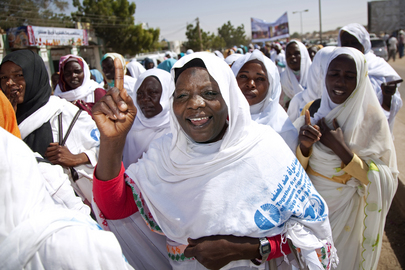 UN Photo
UN Photo
What do we mean by gender mainstreaming? According to UN Women, Gender mainstreaming “is a globally accepted strategy for promoting gender equality. Mainstreaming is not an end in itself but a strategy, an approach, a means to achieve the goal of gender equality. Mainstreaming involves ensuring that gender perspectives and attention to the goal of gender equality are central to all activities - policy development, research, advocacy/ dialogue, legislation, resource allocation, and planning, implementation and monitoring of programmes and projects.” (https://www.un.org/womenwatch/osagi/gendermainstreaming.htm) More than that, gender mainstreaming also means that an organization should reflect a mission for gender sensitivity and equity in their hiring practices, their policies on sexual harassment in the work place, and workplace discrimination. Should an organization adopt a gender mainstreaming approach to development, the organization itself must reflect the goals it wishes to achieve in the field, from within the office place.
The monitoring of African Regional Organisations is therefore an ongoing project that we hope and encourage other organisations to actively participate with us. In this section of our website, we will continually publish information on African Regional Organisations including progress on programs in women, gender and development and monitor their gender equality implementation practices.
It has been very challenging for us to gather information on the number of women in senior position within the African Regional Organisations due to the fact that some of them do not have these information available. We will really appreciate if you can send us any information you may have regarding these organsiations to: This email address is being protected from spambots. You need JavaScript enabled to view it.
2012 Elections Monitoring
This is the section for 2012 elections monitoring.
Tools/Resources for Women Political Participation
This the section for Resoures and tools on Women political participation
Monitoring Women Political Participation & Election
As the Arab spring swept through parts of the Middle-East earlier this year, leading to widespread revolutions and far-reaching changes for the people of Northern Africa, less publicized elections have also taken place in the rest of Africa and scheduled elections are due to take place in 2012 in a number of African countries.
Not only during the middle-eastern uprisings have women repeatedly been seen at the forefront of the revolution, they have also regularly taken part in countless demonstrations and protests throughout Africa. Over the years, women have taken the streets to protest against a variety of issues affecting them, from rising food prices, to the lack of female political and economic participation or to demand the departure of a long-time dictator. Through such actions, women have continuously demonstrated their commitment and their willingness to see their country change for the better. However, when it comes to seeing women in established positions of political power, such as parliamentarians, members of government or even as heads of state, the numbers seems to stall at merely 20%.
In the late 1990s, the United Nations (UN) defined its third Millennium Development Goal as the promotion of gender equality and the empowerment of women. As the UN set a number of specific and quantifiable objectives to meet such goals by the end of the past decade, observers noted that in terms of political participation of women, such objectives have so far only been met in part.
There are still reasons to be optimistic. The proportion of seats held by women in single or lower houses of national parliaments has risen in Northern Africa from 3% in 2000 to 12% in 2011, making such progress the most significant worldwide. In Sub-Saharan Africa, the proportion of seats went from 13% in 2000 to 20% in 2011 (MDG 2011 Report). Noting that women are currently holding less than 20% of the seats in parliaments worldwide, the African continent does not fare too badly, especially considering that Africa has seen the fastest rate of growth in female representation in parliament than any other region of the world.
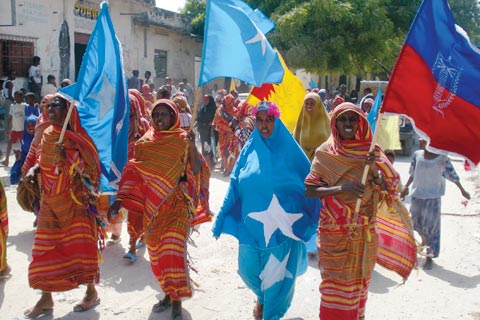 UN Photo
UN Photo
Taking those numbers into account, the debate on imposing quotas resurfaces on a regular basis. However, such quotas do not seem to pave the way for a long time solution. Electoral systems, on the other hand, are the key: such systems must be gender-sensitive, by for example insuring that women candidates receive equal media and public appearances coverage as men do. Moreover, a strong political will at the highest level as well as educated, well-financed female candidates are essential to overcome the current gender imbalance. Finally, it is also crucial to place education of women at the center of such reform and to ensure that women can have a free and fair access to voting polls.
Aim & Objective:
It is with those ideas in mind that MEWC is starting a new and exciting project: the monitoring of elections and political participation of women in Africa. Our aim is to provide a deeper analysis, in the form of briefing papers that will incorporate primary sources: the views and voices of parties and voters on the ground. Through a table with statistical data, we will be specifically looking at the number of women (i) registered to vote, (ii) running as candidates, (iii) who are elected following the elections. Our analysis will also include an article on the gender specificities of the country where the election is taking place. We will be looking at the situation of women prior to the elections as well as the way that the elections impact the lives of women.
While the early 20th century saw queens ruling various African countries, notably Ethiopia and Swaziland, the early 1990s saw women appearing on the African political scene, notably in Liberia, Burundi and Rwanda with female presidents and prime ministers. We now hope that the second decade of this millennium will see the rise of true female political participation sweep through Africa, with an increased number of women taking part in the polls, being elected as candidates and playing a key role in shaping their own country’s future.
This project has two objectives:
- Th first objective is to Provide an easy to use tool to follow the role of women in elections across Africa by covering the position of female candidates before and after the elections have taken place.The accessibility of current and reliable data on women’s political participation, access to leadership is even more difficult to find and compile. Without this information it is difficult to construct an objective view, analyze and interpret the position of women with regards to political participation. By providing this data in an accessible, easy to read framework (ie table) MEWC hopes to provide an information gateway to researchers, policy makers, students other women’s organizations and local voters.
- In the long run the objective of the project is to provide a platform to female voters and candidates to express their views and ideas and raise their political profile and possibly engage with the Pan-African women’s movement via MEWC. MEWC hopes to provide a platform to female candidates and women-led political parties to share their experiences with our readers, policymakers, politicians and other women organizations. By sharing these lessons MEWC hopes to contribute to improving women’s access to information, encourage communication and highlight the prevailing obstacles that prevent parity and gender equity within the context of leadership and political representation.
a) A feature/article on the specific country in which the election is taking place. The article would be short, a brief a synopsis of the situation on the ground made up of the contributions of grass root organization and other national sources and contacts. It would be ideal to be able to try and cover as much as possible of the situation prior to elections and during elections in the body of the text, with a final paragraph on the outcome after the elections have taken place.
b) Table with data that will include the number of women in parliament, government, and female political participation in elections prior and post elections and a distinction will be made between legislative and presidential elections. Put more simply the number of women:
1. Registered to vote
2. Running as candidates
3. That are actually elected in the end
An interactive map that displays the data and statistics compiled on the specific country (part a) and a brief article on the electoral process, activities and situation at the time of elections in the country (part b).
For the time being however as we wait to construct and finalize the interactive map part a will be displayed in an easy to read table format and displayed as such on the website.
We have started monitoring countries who have had elections from October 2011. Please see below the link to the yearly election monitoring.
2011 Elections Monitoring
This is the section for 2011 elections Monitoring
Empowering Diaspora African Women to Lead
African Women Empowering Each other to Lead
Make Every Woman Count is organizing a series of WORKSHOPS between May - September 2012 designed to empower Diaspora African women to play a stronger role as decision-makers in community development and to participate in all areas of social, political and economic development.
Thirty years after the adoption of CEDAW, many women and girls still do not have equal opportunities to realise rights recognised by law. In most countries, women are denied the right to own property or inherit land. They face social exclusion, 'honour killings', FGM, trafficking, restricted mobility and early marriage, among others. Promoting women’s rights refer to the need for women’s equal participation in political, economic, social and cultural spheres, women’s equal access to resources and opportunities, and the eradication of all forms of inequality and discrimination in public and private domains.
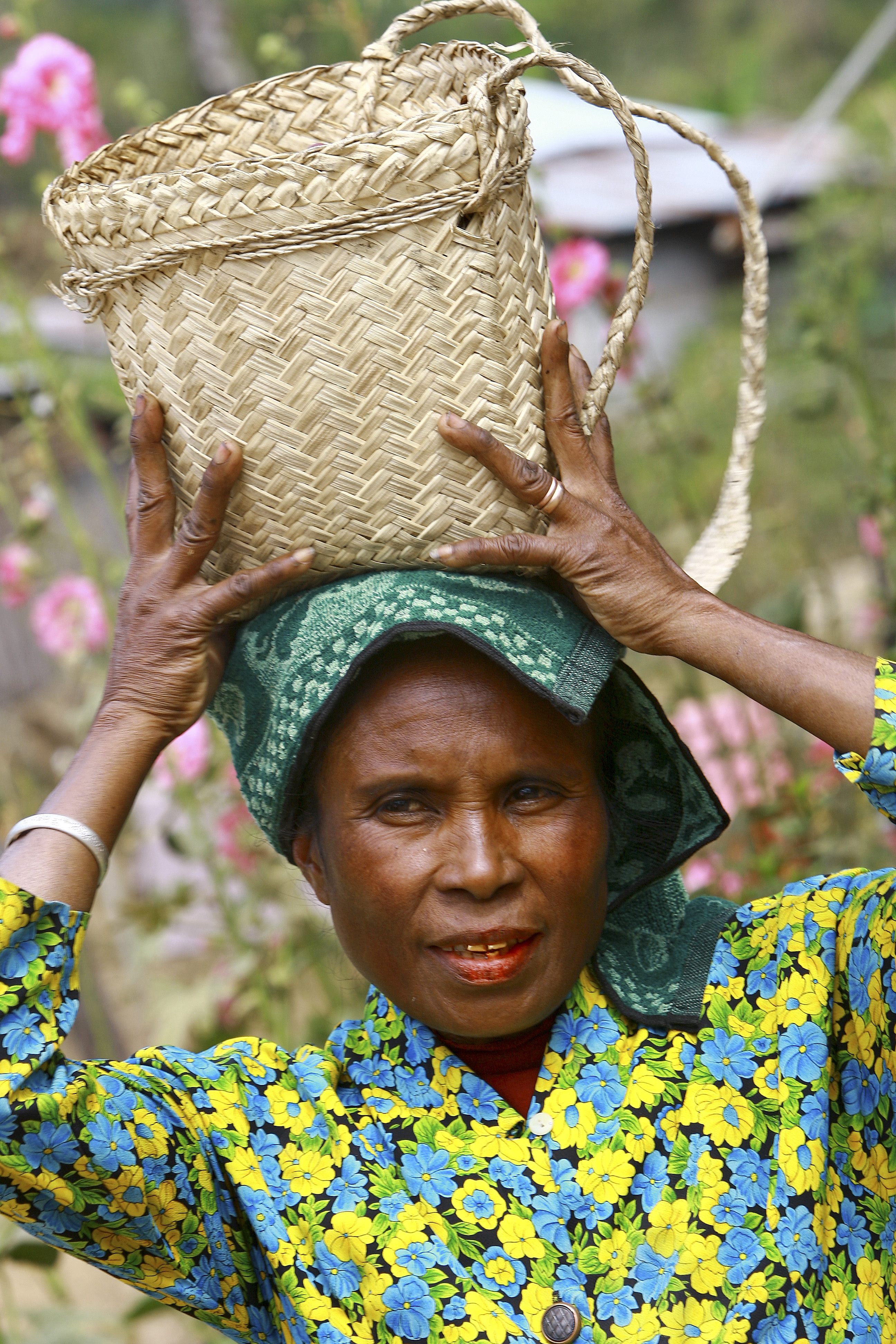 Women's' empowerment can drive economic growth, promote peace and advance development and social justice. Women and girls need to be considered as agents of change so that they can participate to the economic, social, and political development within their community and have equal access to health information and services, education, employment and political positions.
Women's' empowerment can drive economic growth, promote peace and advance development and social justice. Women and girls need to be considered as agents of change so that they can participate to the economic, social, and political development within their community and have equal access to health information and services, education, employment and political positions.
It is with this in mind that MEWC is organising a series of workshops, each workshop focuses on issues relevant to increasing women's awareness of their role in peace advocacy efforts, their legal status, on democracy concepts, leadership, entrepreunership, communication skills and how to lead and maintain effective civic organizations. The goal of the program is to mobilize women to increase their advocacy efforts, and to promote collective efforts by women to be involved at all levels of the society.
The program aims to enable women to reach a level of critical understanding of their legal rights, raise social consciousness pertaining to the human rights violations women face, and provide women with the knowledge and skills to create strategies.
MEWC is working to ensure that African women have a real voice in all governance institutions, from the judiciary to the civil service, as well as in the private sector and civil society, so they can participate equally with men in public dialogue and decision-making, and influence the decisions that will determine the future of their families and countries.
It is in our hope that this serie of worshops will provide the necessary skills and knowledge needed for Diaspora African women to play a stronger role as decision-makers in community development.
This event is FREE and open to all Diaspora African women, however, places are limited and it will be on the first comes first served basis. To avoid disappointment , register as soon as possible to reserve a place.
Refreshments and light lunch will be provided. To book your place, please choose the workshops you would like to attend, fill in the booking form and send it to This email address is being protected from spambots. You need JavaScript enabled to view it.
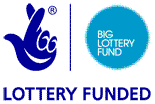
African Women's Decade 2010-2010 - Annual Review
MEWC's report summarises the progress made by African countries regarding women's rights and gender equality on the continent during the first year of the African Women's Decade.
This is done by presenting each country on the continent with a background and a presentation of progress and developments made within different areas, with importance for the human rights of women and gender equality. The report is divided into sections according to regional visions of the African continent, and the countries are then presented individually.
MEWC will publish one report yearly throughout the 10-year duration of the African Women’s Decade. The purpose of the report is to provide an overview of women's rights situation in Africa. It is important to keep track of countries progress with regards to gender equality in Africa for several reasons. It is a way of keeping track of the progress made on the continent and will thus function as a resource for developments throughout the decade. It is also an important tool when advocating for change, as developments regarding progress on gender issues will be made available. Furthermore, the report can function as an incentive for countries to improve their efforts in the areas of gender equality and the human rights of women.
PS: For the last 3 years, we have been doing these reports without any financial help. As an organisation runs entirely by volunteers, monitoring all 54 Africans countries is a lot of work. In order for us to continue doing our work, we need your help. Please consider Donate Now to keep us going or if you would like to help us getting financial help, please get in touch at: This email address is being protected from spambots. You need JavaScript enabled to view it.
Many thanks
MEWC Boutique
Welcome to MEWC Boutique, this fabric bag is a great way for us to pomote MEWC work but also to raise money for the organisation. MEWC bag is the perfect alternative to your daily plastic shopping bags. They are made of 100% and most importantly by MEWC team and it costs £10
MEWC bag £10

Resources Materials
This is a section for Resources Materials
Announcements
In this section, Make Every WomanCount (MEWC) has gathered initiatives that are happening in the local, national and international level related to Women in general and particulary African Women. The announcement section includes a range of activities from individuals, Organisations such as surveys, primary research and dialogues with policy makers, petitions, conference, demonstration, opinion, Statement, Call for papers, etc..
The section aims to be a resource for all different types of opportunities to engage women in women’s rights issues.
MEWC Workshops
Make Every Woman Count is organizing a series of workshops to empower Diaspora African women so that they can play a stronger role as decision-makers in community development and to promote their participation in all areas of social, political and economic development. The workshop will be from May-September 2012
The realisation of women’s rights is based on universal human rights and the rule of law. We need to continue the struggle to end traditions, practices and laws that harm women.
Thirty years after the adoption of CEDAW, many women and girls still do not have equal opportunities to realise rights recognised by law. In most countries, women are denied the right to own property or inherit land. They face social exclusion, 'honour killings', FGM, trafficking, restricted mobility and early marriage, among others. Promoting women’s rights refer to the need for women’s equal participation in political, economic, social and cultural spheres, women’s equal access to resources and opportunities, and the eradication of all forms of inequality and discrimination in public and private domains.
Women's' empowerment can drive economic growth, promote peace and advance development and social justice. Women and girls need to be considered as agents of change so that they can participate to the economic, social, and political development of the continent and have equal access to health information and services, education, employment and political positions.
It is with this in mind that MEWC is organisations a series of workshops, each workshop focuses on issues relevant to increasing women's awareness of their role in peace advocacy efforts, their legal status, on democracy concepts, leadership, Entrepreunership, communication skills and how to lead and maintain effective civic organizations.
The goal of the program is to mobilize women to increase their advocacy efforts, and to promote collective efforts by women to be involved at all levels of the society.
The program aims to enable women to reach a level of critical understanding of their legal rights, raise social consciousness pertaining to the human rights violations women face, and provide women with the knowledge and skills to create strategies. It is vital for African women to know and understand their rights so that they can take their right place in the society as agents of change.
MEWC is working to ensure that African women have a real voice in all governance institutions, from the judiciary to the civil service, as well as in the private sector and civil society, so they can participate equally with men in public dialogue and decisionmaking, and influence the decisions that will determine the future of their families and countries. It is in our hope that this serie of worshops will provide the necessary skills and knowledge needed for Diaspora African women to play a stronger role as decision-makers in community development.
This event is FREE and open to all Diaspora African women in the UK, however, places are limited and it will be on the first comes first served basis. To avoid desapointemnt, register as soon as possible to reserve a place. The workshops will be carried out by professionals in the fields with many year sof experience.
Refreshments and a light lunch will be provided
Handouts & Guides
In order to empower and bring forth the human rights of women it is important to have tools that match the purpose. In this section Make Every Woman count has gathered handouts and guides produced by various organisations and government entities.
These guides and handouts cover various aspects of human rights of women and can be used in a range of settings.
Gender Training Material
When attempting to generate change and improvement training is vital. For this end Make Every Woman Count has gather Gender Training Guides to be used by women's organisations, women's grassroots, women actvistts or by anyone who seeks to work with gender issues.
The focus of the material is with regards to women mainly to the African continent
Resources
Our resources section is where we make available useful resources such as studies, reports from the United Nations, Civil Society, NGOs, Governments, Academic Institutions and other sources related to women and specially women in Africa and other important documents such as copies of the Maputo Protocol and UNSCR 1325.
We have been able to gather together important and useful information while at the same time fostering information sharing among other organizations working for women’s rights.
It ranges from Women, Peace and Security; Political Participation; Economic Empowerment, Violence Against Women to HIV/AIDS & Reproductive and so on.
2018 Election Monitoring in Africa
Our aim with the monitoring of elections and political participation of women in Africa is to provide a deeper analysis, in the form of briefing papers that will incorporate primary sources: the views and voices of parties and voters on the ground. Through a table with statistical data, we will be specifically looking at the number of women (i) registered to vote, (ii) running as candidates, (iii) who are elected following the elections. Our analysis will also include an article on the gender specificities of the country where the election is taking place. We will be looking at the situation of women prior to the elections as well as the way that the elections impact the lives of women.
While the early 20th century saw queens ruling various African countries, notably Ethiopia and Swaziland, the early 1990s saw women appearing on the African political scene, notably in Liberia, Burundi and Rwanda with female presidents and prime ministers. We now hope that the second decade of this millennium will see the rise of true female political participation sweep through Africa, with an increased number of women taking part in the polls, being elected as candidates and playing a key role in shaping their own country’s future.
Objectives:
The objective is to provide an easy to use tool to follow the role of women in elections across Africa by covering the position of female candidates before and after the elections have taken place.The accessibility of current and reliable data on women’s political participation, access to leadership is even more difficult to find and compile. Without this information it is difficult to construct an objective view, analyze and interpret the position of women with regards to political participation. By providing this data in an accessible, easy to read framework (ie table) MEWC hopes to provide an information gateway to researchers, policy makers, students other women’s organizations and local voters...
COVID-19 Resources
Early this year, we witnessed the outbreak of COVID-19 in China and in less than a few months, the virus has spread all over the globe propelling the World Health Organisation to declare it as a global pandemic.
As of April 13, 2020, there are 1,904,566 Total known cases, 118,459 Total deaths and 5,588 Latest deaths, the high number of infection and death has led most affected countries to put in place a national lockdown to try to halt the spread of the highly contagious virus.
MEWC is joining the International Community to play its part in the fight against the deadly virus, we will be using our website and social media to share resources, information about the virus.

